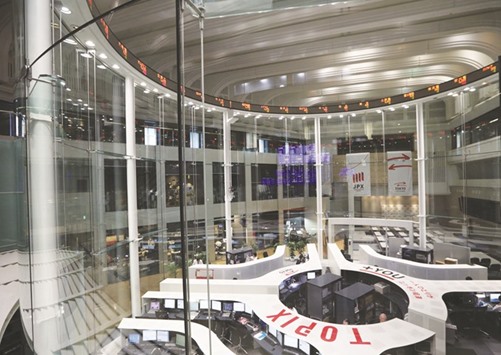After booming in the early days of Abenomics, signs are mounting that Japan’s real estate investment trust market is losing steam.
The Tokyo Stock Exchange REIT index has fallen 3.4% in the past 12 months, far underperforming the Topix index’s 14% advance. Five of seven new listings last year failed to rise above their offering price. And in a hurdle that analysts say may raise the bar for new offerings, the Tokyo Stock Exchange Inc in December said that new REITs would need to submit documents on the reasoning behind their pricing when they apply for an initial public offering.
The market capitalisation of the TSE REIT index has almost tripled to nearly ¥12tn ($105bn) since the end of 2012 as yield-hungry investors flocked to the offerings amid volatile stock markets and interest rates that have languished near record lows. That appeal is being eroded as stocks have surged since the election of Donald Trump and global yields have climbed.
“Investors are looking at whether there’s still growth potential in these REITs, whether they can continue to purchase new assets when real estate prices have been rising,” said Masahiro Mochizuki, an analyst at Credit Suisse Group in Tokyo.
Adding to market pressures is what analysts see as the more vigilant stance by the Tokyo bourse, which also said it would evaluate whether listing candidates can maintain profit distributions under difficult economic conditions. While exchange officials said that their actions merely put into writing procedures that were already happening and weren’t intended as a toughening of rules, analysts at Morgan Stanley MUFG Securities Co and Mizuho Securities Co see a stronger message.
“I think the changes this time came because the TSE had recognised there’s a need for tougher listing requirements,” said Atsuro Takemura, analyst at Morgan Stanley MUFG. Specifically, the bourse is saying prices need to be transparent and objective, said Takashi Ishizawa, a senior researcher at Mizuho Securities, as the procedure to date “has been close to a black box state.”
The number of listed J-REITs dropped from 42 in 2007 to 33 by April 2012 in the wake of the global financial crisis, according to IBRC Inc.
Listings have swelled again along with the Abenomics-fuelled rise in valuations, and the TSE REIT index now comprises 57 members. In this context, quality control is an absolute necessity, says Naoki Fujiwara, chief fund manager at Shinkin Asset Management Co in Tokyo.
“Unless the quality of IPOs is kept high, when the trading environment eventually worsens, we’ll have similar problems to what we faced after the financial crisis,” Fujiwara said.
Tokyo saw the steepest office price gains among 14 global cities in 2014 and 2015, according to Japan Real Estate Institute. Ten-year JGB yield climbed to 0.15% this month, highest level since Bank of Japan implemented negative rate policy last January. The number of J-REIT listings last year was the highest in 10 years, with seven IPOs.

Employees work on the trading floor of the Tokyo Stock Exchange. The REIT index has fallen 3.4% in the past 12 months, far underperforming the Topix index’s 14% advance.
